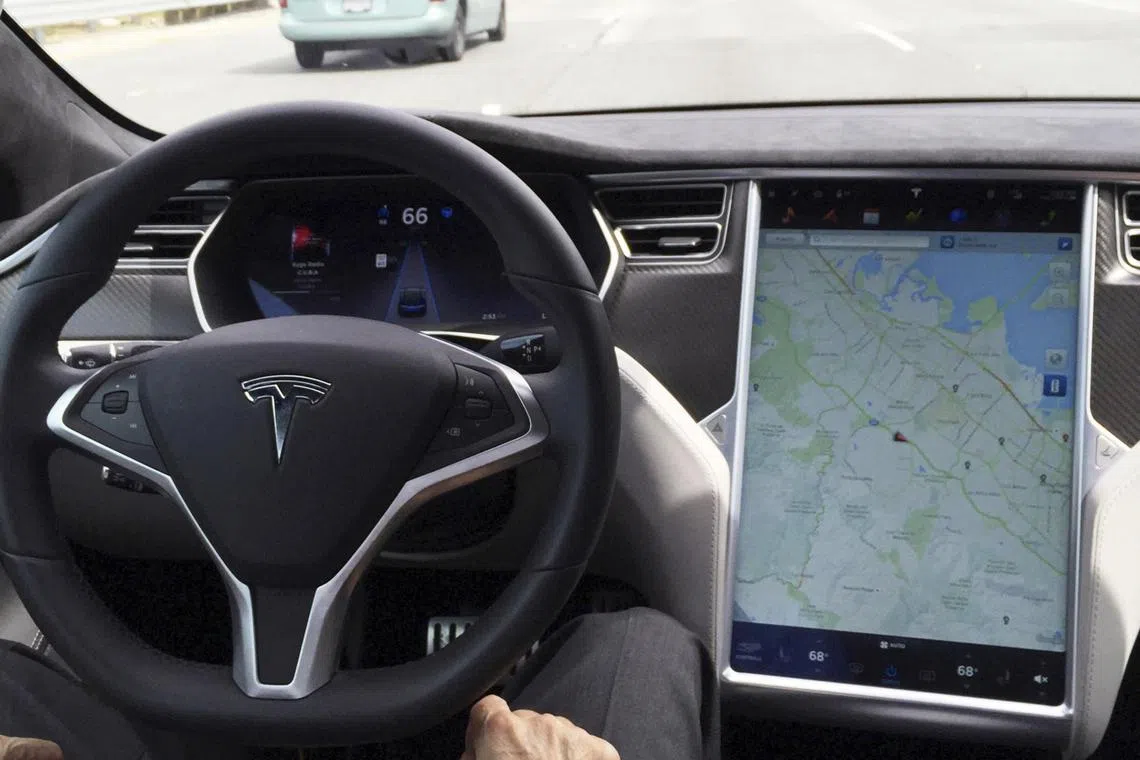Tesla offers US buyers free trial of driver-assistance system amid falling demand
Sign up now: Get ST's newsletters delivered to your inbox

Not autonomous: A Tesla Model S driver taking his hands off the steering wheel as the car moves in so-called Autopilot mode in San Francisco on April 7, 2016.
PHOTO: REUTERS
NEW YORK – Electric carmaker Tesla will offer customers in the United States a month’s free trial of its driver-assist technology, dubbed Full Self-Driving (FSD), chief executive Elon Musk said on March 25, as softening demand and price competition pressure the company’s sales and margins.
Mr Musk has long touted the driver-assistance software, priced at US$12,000 (S$16,200), as a potential profit generator for the company, but it has fallen short of his promise of full autonomy for years, amid regulatory and legal scrutiny of Tesla’s safety and marketing.
“All US cars that are capable of FSD will be enabled for a one-month trial this week,” Mr Musk said in a post on social media platform X.
He has also told Tesla staff to give demonstrations of FSD to new buyers and owners of serviced vehicles, according to two e-mail messages verified by an anonymous source.
“Almost no one actually realises how well (supervised) FSD actually works,” the chief executive said in one e-mail sent to Tesla employees.
Researcher Troy Teslike said the “FSD take rate” was declining in North America, with about 14 per cent of Tesla customers buying the package in the third quarter of 2022, down from a record high of 53 per cent in the third quarter of 2019.
Tesla’s margins have been hurt by a price war with rivals that started more than a year ago.
“The combination of substantial price cuts on the vehicles and dramatically lower FSD take rates has severely hurt Tesla’s margins,” said analyst Sam Abuelsamid at advisory firm Guidehouse Insights.
“The mandate to demonstrate FSD as it is today is just the latest in a long-running series of end-of-quarter stunts by Mr Musk intended to boost deliveries and revenues.”
The FSD software, which Tesla says does not make its vehicles autonomous and requires active driver supervision, has also been offered at a subscription of US$199 a month.
Meanwhile, Tesla staff are now required to install and demonstrate FSD before handing cars over to buyers in North America – a regulation which Mr Musk has called a “hard requirement” that will slow down deliveries.
Tesla and Mr Musk did not immediately respond to requests for comment.
The directive shows how Tesla is tightening the reins on technology that is both a significant source of revenue and a magnet for controversy.
The carmaker has drawn scrutiny over its marketing of features with names such as Full Self-Driving and Autopilot, which could suggest the cars drive themselves despite requiring fully attentive drivers to keep their hands on the wheel.
Yet, the company promises in marketing materials that “your car will be able to drive itself almost anywhere with minimal driver intervention and will continuously improve”.
Elsewhere, Tesla’s Autopilot and FSD technology and nine other assisted-driving systems marketed by major carmakers received “poor” ratings from the US Insurance Institute for Highway Safety (IIHS) in a new study released on March 12.
The IIHS, a safety research arm of the insurance industry, also said there is no evidence that Autopilot or other assisted-driving systems have real-world safety benefits, based on crash data.
“We are able to look at insurance claims data. We have been able to look at vehicles with and without these (systems) and determine there is no reduction in claims as a result of these more advanced systems,” IIHS president David Harkey said.
By comparison, there is evidence that automatic emergency braking systems cut rear-end collisions by 50 per cent and lowers incidents of a vehicle hitting a pedestrian by 30 per cent, he said.
Tesla and Mr Musk have said a Tesla operating with Autopilot engaged is about 10 times safer than the US average and five times safer than a Tesla without the technology enabled.
The IIHS study rated 14 assisted-driving systems from nine vehicle-makers against standards it developed. The US National Highway Traffic Safety Administration (NHTSA) has no formal standards governing advanced-driver assistance systems, or Adas in industry terminology.
“There are no federal regulations nor is there good consistent guidance,” Mr Harkey said. “That was our reason for putting these safeguards together.”
Of the systems IIHS tested, only one earned an acceptable rating – the Lexus Teammate with Advanced Drive, offered in 2023 on a small number of Toyota Motor’s luxury Lexus LS hybrid sedans.
“Toyota continuously aims to increase vehicle safety,” Toyota said. “As a part of that effort, Toyota, among other things, considers performance in third-party testing programmes, such as NHTSA’s New Car Assessment Program and IIHS’ Top Safety Pick programme.”
GM’s Super Cruise and Nissan’s ProPilot Assist with Navi-link offered on the 2023 to 2024 Ariya EV received “marginal” overall ratings.
Different assisted-driving systems from Tesla, Mercedes-Benz, BMW, Nissan, Ford, GM, Hyundai’s Genesis brand and Geely’s Volvo Cars brand received “poor” overall ratings, although all achieved “good” scores on certain elements of the IIHS tests, the group said. Reuters, Bloomberg


